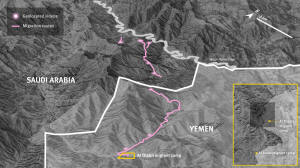Saudi border guards killed hundreds of Ethiopian migrants, HRW says
 Send a link to a friend
Send a link to a friend
 [August 22, 2023]
By Andrew Mills, Tiksa Negeri and Milan Pavicic [August 22, 2023]
By Andrew Mills, Tiksa Negeri and Milan Pavicic
DUBAI/HARAR, Ethiopia (Reuters) - Saudi Arabian border guards have
killed hundreds of Ethiopian migrants, including women and children, who
attempted to enter the kingdom along its mountainous border with Yemen,
Human Rights Watch (HRW) said on Monday.
In a 73-page report, the rights group said Saudi guards used explosive
weapons to kill some migrants and shot at others from close range. It
compiled testimony from 38 Ethiopians who tried to cross the Yemen-Saudi
border between March 2022 and June 2023, as well as four relatives or
friends of migrants.
Human Rights Watch said attacks against groups of migrants, who used
remote mountain tracks to cross into Saudi Arabia by foot, were
"widespread and systematic" and that the "killings are continuing".
A Saudi official, who did not provide their name, said on Monday in an
emailed response to questions to the government's media office that
HRW's allegations were "unfounded and not based on reliable sources."
Saudi authorities have also strongly denied allegations made by U.N.
officials in 2022 that border guards systematically killed migrants last
year.

The Ethiopian government in Addis Ababa and Houthi officials in Yemen
did not respond to requests for comment Reuters sent early on Monday.
A State Department spokesperson said the U.S. had raised concerns about
the allegations in the report with the Saudi government and had urged it
to undertake a thorough and transparent investigation.
There are an estimated 750,000 Ethiopians in Saudi Arabia, according to
U.N. studies. Many have fled economic hardship in Ethiopia, which has
also seen its northern province of Tigray riven by a brutal conflict in
recent years.
The migration route from the Horn of Africa, across the Gulf of Aden,
through Yemen and into Saudi Arabia - one of the richest countries in
the Arab world - is a well-established corridor for Ethiopian migrants.
HRW said it based its report on witness testimony as well as 350 videos
and photos of wounded and killed migrants, and satellite imagery showing
the location of Saudi Arabian guard posts. The advocacy group said,
however, its researchers were unable to access the stretch of the
Yemen-Saudi border where the alleged killings took place.
"People told me that they witnessed killing fields: bodies scattered all
over the mountain area...people blown in half," Nadia Hardman, the
report's author, said in an interview with Reuters.
Hardman said that since 2022 there has been a "deliberate escalation in
both the number and manner of targeted killings."
Reuters independently analysed video clips provided by HRW showing
corpses, injured people, the digging of graves and groups of people
traversing mountain paths.

Roads, buildings and the shape of mountains matched satellite and
terrain imagery, enabling Reuters to verify that the videos were shot at
the Yemen-Saudi border. The news agency could not verify when they were
filmed.
"I STARTED TO PRAY"
Mustafa Sofian Mohammed, 22, told Reuters his group of 45 Ethiopians
were nearing the end of a three-day walk to the border on July 10, 2022
when machine gun and grenade fire erupted from Saudi territory,
partially severing his left leg above the ankle.
[to top of second column]
|


"I looked around to make sure if it was really happening ... That
was when I realized I had no leg anymore and then I started to
pray," said Mustafa, without specifying exactly where the incident
took place. He said he tied a scarf around his injury and was later
rescued by another group of men attempting the border crossing.
Speaking to Reuters in the eastern Ethiopian city of Harar, Mustafa
said he was treated in Al Thawra Hospital in the Yemeni capital
Sanaa and then flown to Addis Ababa, where his treatment was paid
for by the International Organization for Migration (IOM). Medical
discharge papers from the Hallelujah Hospital in Addis seen by
Reuters show he was treated there for an infected amputation wound
and that he was admitted as an IOM-sponsored patient.
Mustafa, who was one of the migrants cited by HRW in its report,
said he knew of only three others in his group who survived the
attack: "The rest are unreachable...only God knows what happened to
them."
Sofian Mohammed Abdulla, Mustafa's 48-year-old father, confirmed his
son's account. Reuters also reviewed video and photos provided by
Mustafa of his partially severed leg he said were taken at hospital
in Yemen shortly after the attack. The news agency could not
independently confirm this.
The International Rehabilitation Council for Torture Victims (IRCT),
a global network of civil society organizations and independent
experts who support survivors of torture, said it had analyzed the
videos and photographs of dead or injured migrants compiled by HRW
and found there were "clear patterns" of munitions explosions and
gunshot wounds.
The UN Human Rights Office said in an email on Monday that it had
received information pointing to the impact of military operations
at the border on civilians and has been monitoring the situation
"for some time". It called for the HRW allegations to be fully
investigated and for those responsible to be held to account.

"Trying to stop migration using the barrel of a gun is intolerable,"
U.N. spokesperson Stephane Dujarric told a briefing in New York,
adding that the report raised "very serious allegations".
In October 2022, the U.N. Special Rapporteur on extrajudicial,
summary or arbitrary executions had said in a letter to Saudi
authorities that the U.N. had received reports of the "systematic"
killing of 430 migrants at the border in at least 16 incidents
between Jan. 1 and April 30, 2022.
A letter issued by the kingdom's U.N. mission in March 2023 rejected
the allegation, saying that Saudi border security regulations
"ensure humane treatment...no form of mistreatment or torture is
tolerated."
(Reporting by Andrew Mills in the Gulf Bureau, Tiksa Negeri in Harar,
Ethiopia and Milan Pavicic in Gdansk; additional reporting by Emma
Farge in Geneva, Daphne Psaledakis in Washington, and Dawit Endeshaw
in Addis Ababa; Writing by Andrew Mills; Editing by Daniel Flynn)
[© 2023 Thomson Reuters. All rights
reserved.]This material may not be published,
broadcast, rewritten or redistributed.
Thompson Reuters is solely responsible for this content.
 |